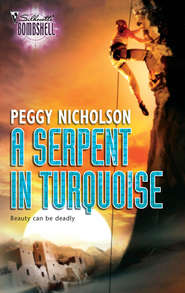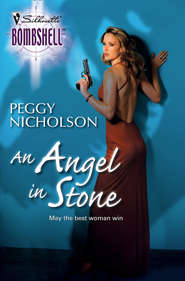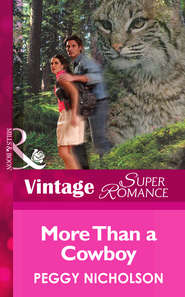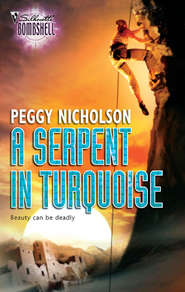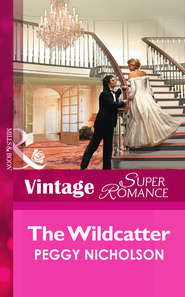По всем вопросам обращайтесь на: info@litportal.ru
(©) 2003-2024.
✖
True Heart
Автор
Год написания книги
2019
Настройки чтения
Размер шрифта
Высота строк
Поля
“I see,” murmured Michelle into the bleak silence. “Well, to be perfectly selfish, I’m glad. I think Jim could use the help. Whenever I’ve seen him this past summer, he’s been looking frazzled. That hand of his is an absolute sweetheart, but he reminds me of a pet tortoise a roommate of mine had years ago—sort of dried up and deliberate. I have a hard time picturing him getting his boot up into a stirrup, much less catching a calf.”
Kaley glanced at her in surprise. “You’ve met Whitey, too? How long have you lived in Trueheart?” She’d tried to make it back for two or three weeks every summer. Alone, since Richard always begged off. But these past two years, she’d been working on the master’s degree she needed to maintain her teaching accreditation and her schedule of classes had prevented her visiting. Haven’t been home since Dad’s funeral, she realized with a pang of guilt. A lot could change in eighteen months.
“Just over a year,” Michelle said. “I bought Simpson’s café down on Main Street. It’s Michelle’s Place now—best breakfast in southwest Colorado, if I do say so. Gourmet suppers on Friday and Saturday nights, with plans to expand to six nights if I can ever find a decent sous chef.”
“Just what the town needs,” Kaley said approvingly. “A serious restaurant. When I lived here, a hot date was steakburgers for two at Mo’s Truckstop out on the highway.”
“Still is, for the older crowd,” Michelle admitted. “And most of the truckers and cowboys. But some of the younger set are giving me a chance. Then there are the yuppie commuters moving up from Durango, plus the dudes and the tourists.”
Whenever Kaley and Jim spoke on the phone, Jim complained about the way southwestern Colorado was changing. Five-acre ranchettes replacing working cattle ranches. Outsiders moving in with money that the locals couldn’t hope to match. Values they didn’t want to match. Ideas of ways to “improve” a country that the natives liked just the way it was and always had been.
So far the cattlemen north of Trueheart were holding their own, with most of the changes confined to the town, Jim had reported. Suntop Ranch, the largest outfit in this part of the state, seemed to exert some sort of gravitational pull, holding the smaller ranches like Kaley and Jim’s Circle C safe in its orbit. So far.
Still, as the land folded itself into deeper and greener valleys, steeper ridges that lifted toward massive peaks, looming dark against a rosy sky, Kaley looked fearfully for signs of change. She ticked off each familiar landmark as she came to it with a sigh of relief. On her left the sign to the Ribbon River Dude Ranch—guests still Welcome. Then to her right, the turnoff to the private airport with its bluff overlooking the distant town, where courting couples parked on summer nights to “watch the planes take off.” Then they were coasting down the foothills into Trueheart, past Mo’s Truckstop, past the tiny Congregationalist church with its modest white steeple, where, once upon a time, so long ago it almost seemed like a fairy tale, Kaley had planned to be married.
And if Tripp McGraw had really wanted to marry me? She touched her stomach and tipped up her chin. Well, he hadn’t. And if he had, she wouldn’t be carrying this precious passenger. Much as they’d hurt at the time, things worked out for the best. Would do so again, she told herself firmly.
Michelle glanced at her watch as they turned onto Main Street. “Speaking of breakfast, I hope you’ll let me feed you a magnificent one. Eggs Benedict maybe? Or buckwheat pancakes with native berries?”
“Some other time I would love that,” Kaley assured her. “But I want to catch Jim before he rides out for the day, so…”
Michelle made a ticking sound with her tongue. “He doesn’t know you’re coming?”
“No.” Kaley had hoped till the last day—till the very last hour—that she and Richard could work things out. She’d have felt disloyal airing their differences—temporary differences, she’d been so sure—before her younger brother. Especially since Jim had never, in all these years, quite warmed to his brother-in-law. Why give him further reasons to disapprove, when what she wanted was a larger, happier family, not a family divided?
“No, I didn’t tell him, but it doesn’t matter.” There’d always be a place for her and hers at the ranch. A wave of weary gratitude washed over her as she braked the car before Michelle’s Place. She was luckier than so many single mothers. Because no matter how desperately lonely she’d been this past month, she wasn’t alone. She could count on her brother, count on her welcome, count on her bedroom being there, bed made and pillows fluffed, her favorite childhood books lined up on her shelves, her great-grandmother’s old pine wardrobe standing ready for her clothes. Whether she deserved it or not, she had a place in the world, reserved in her name. While such a sanctuary waited, she’d count herself among the lucky.
“Well, if it turns out you miss him,” said Michelle, opening her door before the car had stopped, “don’t hesitate to come back into town and let me feed you.”
“Thanks.” Though if she missed Jim, it was bread, butter and milk, then she’d crawl upstairs for a hot shower and a round-the-clock collapse.
Michelle gathered up her purse and overnight bag, swung her long legs out of the car, slammed the door and leaned back in the open window. “Thanks again, Kaley.” She glanced aside as a red pickup tooted its horn and turned into her parking lot. “And here comes Sam Kerner, riding point. I’m going to get no end of grief that there’s no coffee waiting.”
The local vet, a big-animal specialist. Likely as not, Sam was stopping in to Michelle’s on his way home from tending a sick cow. Kaley smiled wearily. Her landmarks were all holding true.
“And Sheriff Naley,” Michelle added as a gray pickup followed the red into her lot. “Kaley, if you ever want to just…talk. About anything at all? Breakups are tough—I should know. Anyway…” She shrugged and smiled her wide, rueful smile. “I live upstairs here and the coffeepot’s always on. Stop by any ol’ time.” She glanced back the way they’d come. “Oh, now, here comes a customer to die for. Do you know Tripp McGraw?”
“Vaguely. Well, guess I should let you get cooking.” Kaley revved the engine, lifted a hand in farewell as Michelle hastily straightened. “See you!” She had barely time to swing out from the curb before Tripp’s oncoming truck. It loomed up in her rearview mirror, its driver a dim, wide-shouldered shape beyond the glass. He was towing a horse trailer behind, she noted, as she accelerated and he slowed for his turn. But no—oh, no—he’d only slowed to wave to Michelle and now he was driving on.
He followed her for a block or two, and Kaley drove with hunched shoulders, hands clenching her wheel, though she was being silly. There was no way Tripp could know this car was hers. She’d been dodging him successfully for years.
Still, she averted her face as she made her turn north toward the mountains, and she let out a pent breath when he drove toward the east. “Whew!” she whispered, and drew in a shaky breath. Downhearted and tired as she was this morning, he would have been one local landmark too many.
CHAPTER TWO
KALEY DROVE the last ten miles to the ranch in a haze of exhaustion. The early sun shining in her eyes made her squint, and once her lashes drooped, conscious thought dissolved into drifting images, the present blurring with vivid memories of the past. A fine herd of Black Angus crosses on Suntop land—the Tankerslys always had the best. Five pronghorn antelope on a hill overlooking the highway. Buzzards riding an early morning thermal to the south—something dead over there, maybe? No snow on the peaks yet in August, but soon, soon. She hadn’t skied in years, used to love to, but maybe this year… With a baby coming on, Kaley? For a moment she’d actually forgotten!
On her left now was the road to the McGraw ranch. The McGraw brand was burned into the arching plank signboard: M Bar G. Brands… His should have been a comet, a shooting star…that way he used to touch his scarred cheek when he encountered someone unexpectedly, or when he was sad or uncertain… She’d caught his hand more than once, drawn it down to her lips and kissed it…
Her left front wheel dropped into a pothole in the road— Kaley yelped her surprise and took a firmer grip on the wheel.
Sunlight gave way to shadow as the road passed onto National Forest land. Aspens shivered in no breeze at all along the flashing creek, their leaves here and there already gleaming golden—getting late. Too late. Jim will have ridden out by now. But maybe Whitey would still be puttering around the kitchen. He’d have some harsh things to say about Richard; he’d never approved of her marrying a lawyer. Harsh things to say to her, too. Kaley smiled. Coming home.
“And here we are,” she informed her tiny passenger as a line of barbed wire slanted down the hill to define the border of Cotter land. She frowned—a post leaning badly there, hadn’t Jim noticed? At least now he’ll have some help. She ought to be able to ride and work till Christmas, anyway, as long as she was careful. She certainly meant to pull her weight—her lips curved in a rueful grin. Guess that’ll just get harder and harder, for a while. Still, though she was claiming sanctuary, she had no intention of being a burden.
At last she came to the private road to the ranch. The house wasn’t visible yet, but after her car topped the second low rise, she looked down into the valley and let out an audible sigh. Home at last!
IT WAS EIGHT BY THE CLOCK in her car when Kaley stepped out, stretched her aching limbs and trudged to the kitchen door. Suddenly she was just as glad Jim would likely not be home. She was too tired to explain anything. Tonight, after she’d slept, would be soon enough.
She entered via the back door and walked through the mudroom, then stopped in the kitchen doorway. “Jim!” Dressed, not in his usual Wranglers and boots, but in a pair of town-going trousers and, wonder of wonders, an ironed shirt. His hair not as shaggy as usual, but clipped close to his head.
“Kaley! You got my—” Her brother paused, frowning, to set the mug of coffee he’d been drinking on the counter. “You can’t have gotten it yet.”
“Gotten what?” She stood blinking stupidly, still waiting for the whoop and a hug that should be coming.
Jim made no move to close the gap between them. “My letter. But there’s no way, when I only mailed it yest—” The scowl on his tanned face deepened. “Whitey called you! Why, that old mule-headed, son of a—”
“Nobody called me. What’s going on?” She nodded at his clothes. “Somebody died?” A funeral. That could be the only explanation for such attire on a workday.
“No.” At last he moved toward her, to brush the skin under her lashes with one work-hardened fingertip. “You look done in, sis. Come sit down. Want a cup of coffee?” He guided her toward the kitchen table, swung a chair out for her.
She stared at the battered canvas duffel bag that rested on the floor beside it. Their father’s air force bag. It had survived Vietnam along with him, then come home to be bequeathed, years later, to his son.
The bag looked stuffed full. Her eyes skated along the scarred linoleum from the bag to Jim’s unbooted feet. “Jim, what’s— You sent me a letter about…what?”
“Here. Sit.” He pressed her into the chair, moved his bag out to the mudroom—as if she’d forget about it!—then busied himself, avoiding her searching gaze, fixing her a mug of coffee from the pot on the stove. “Guess you missed it. My letter’s probably hitting your mailbox today. But what are you doing here?”
Apparently she’d have to talk first. She let out a long-suffering sigh and propped her face in her hands. “That’s not my mailbox anymore, Jim. Not my address. I’ve left Richard. Divorced him yesterday in Vegas.”
The mug Jim had been offering her dropped from his fingers—smashed on the floor, hot coffee spattering their feet and ankles. He stood gaping, then closed his eyes, shook his head and said softly, fervently, “Crap… Crap, crap, tell me you’re joking!”
“No joke.” She could understand surprise—she was still in shock herself—but horror? “You never liked him anyway, so— Jim, what’s wrong?”
He crunched through the bits of pottery to yank out the chair opposite hers and collapse into it. “Crap.” He broke into bitter laughter, then stopped abruptly. “Who says Cotters never have any luck? It’s just that it’s all the wrong kind of—”
She smacked the table flat-handed. “Tell…me…what…was in that letter?” He lost that black smile; his dark eyebrows flew together, and she added hastily, “Please? What did you want to tell me?”
His eyes stopped flashing and dropped to the table. He reached for the sugar bowl, lifted the lid and clinked it aimlessly back into place. “Monday after next, Kaley, what date is that?”
“Hey, I’ve driven all night. I’m too tired for guessing games.”
“It’s my birthday. My twenty-eighth.”
She studied his face, the same dark-lashed, navy-blue eyes as her own, meeting hers half in pain, half in angry challenge. What was she missing here? “Yes. I’d forgotten.”
“I’ll be twenty-eight, Kaley.” He scowled when she still didn’t get it. “You can’t join the air force any older than that.”
“Oh…Jim!” He hadn’t mentioned that ambition in years, not since she went away to college. She’d assumed it was simply a teenager’s dream, long left behind. He’d grown up on their father’s tales of his flying adventures in the war. Hadn’t Jim noticed, as she had, how carefully those tales had been edited? Their father had told them of the good times—the wonderful friendships forged in wartime, the sun on snowy clouds like castles in the air, the feel of a jet answering as sweetly to the yoke as the best cutting horse to the rein, the thrill of night landings on an aircraft carrier in the open sea.






